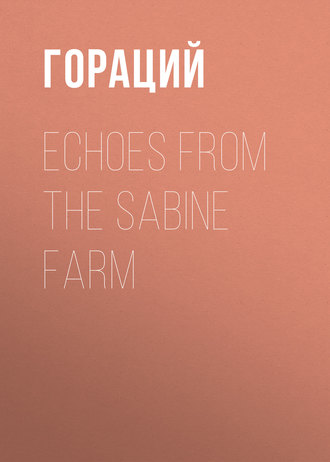полная версия

Гораций
Echoes from the Sabine Farm
TO ARISTIUS FUSCUS
Fuscus, whoso to good inclines,
And is a faultless liver,
Nor Moorish spear nor bow need fear,
Nor poison-arrowed quiver.
Ay, though through desert wastes he roam,
Or scale the rugged mountains,
Or rest beside the murmuring tide
Of weird Hydaspan fountains!
Lo, on a time, I gayly paced
The Sabine confines shady,
And sung in glee of Lalage,
My own and dearest lady;
And as I sung, a monster wolf
Slunk through the thicket from me;
But for that song, as I strolled along,
He would have overcome me!
Set me amid those poison mists
Which no fair gale dispelleth,
Or in the plains where silence reigns,
And no thing human dwelleth,—
Still shall I love my Lalage,
Still sing her tender graces;
And while I sing, my theme shall bring
Heaven to those desert places!
TO ALBIUS TIBULLUS
I
Not to lament that rival flame
Wherewith the heartless Glycera scorns you,
Nor waste your time in maudlin rhyme,
How many a modern instance warns you!
Fair-browed Lycoris pines away
Because her Cyrus loves another;
The ruthless churl informs the girl
He loves her only as a brother!
For he, in turn, courts Pholoe,—
A maid unscotched of love's fierce virus;
Why, goats will mate with wolves they hate
Ere Pholoe will mate with Cyrus!
Ah, weak and hapless human hearts,
By cruel Mother Venus fated
To spend this life in hopeless strife,
Because incongruously mated!
Such torture, Albius, is my lot;
For, though a better mistress wooed me,
My Myrtale has captured me,
And with her cruelties subdued me!
TO ALBIUS TIBULLUS
II
Grieve not, my Albius, if thoughts of Glycera may haunt you,
Nor chant your mournful elegies because she faithless proves;
If now a younger man than you this cruel charmer loves,
Let not the kindly favors of the past rise up to taunt you.
Lycoris of the little brow for Cyrus feels a passion,
And Cyrus, on the other hand, toward Pholoe inclines;
But ere this crafty Cyrus can accomplish his designs
She-goats will wed Apulian wolves in deference to fashion.
Such is the will, the cruel will, of love-inciting Venus,
Who takes delight in wanton sport and ill-considered jokes,
And brings ridiculous misfits beneath her brazen yokes,—
A very infelicitous proceeding, just between us.
As for myself, young Myrtale, slave-born and lacking graces,
And wilder than the Adrian tides which form Calabrian bays,
Entangled me in pleasing chains and compromising ways,
When—just my luck—a better girl was courting my embraces.
TO MÆCENAS
Mæcenas, thou of royalty's descent,
Both my protector and dear ornament,
Among humanity's conditions are
Those who take pleasure in the flying car,
Whirling Olympian dust, as on they roll,
And shunning with the glowing wheel the goal;
While the ennobling palm, the prize of worth,
Exalts them to the gods, the lords of earth.
Here one is happy if the fickle crowd
His name the threefold honor has allowed;
And there another, if into his stores
Comes what is swept from Libyan threshing-floors.
He who delights to till his father's lands,
And grasps the delving-hoe with willing hands,
Can never to Attalic offers hark,
Or cut the Myrtoan Sea with Cyprian bark.
The merchant, timorous of Afric's breeze,
When fiercely struggling with Icarian seas
Praises the restful quiet of his home,
Nor wishes from the peaceful fields to roam;
Ah, speedily his shattered ships he mends,—
To poverty his lesson ne'er extends.
One there may be who never scorns to fill
His cups with mellow draughts from Massic's hill,
Nor from the busy day an hour to wean,
Now stretched at length beneath the arbute green,
Now at the softly whispering spring, to dream
Of the fair nymphs who haunt the sacred stream.
For camp and trump and clarion some have zest,—
The cruel wars the mothers so detest.
'Neath the cold sky the hunter spends his life,
Unmindful of his home and tender wife,
Whether the doe is seen by faithful hounds
Or Marsian boar through the fine meshes bounds.
But as for me, the ivy-wreaths, the prize
Of learned brows, exalt me to the skies;
The shady grove, the nymphs and satyrs there,
Draw me away from people everywhere;
If it may be, Euterpe's flute inspires,
Or Polyhymnia strikes the Lesbian lyres;
And if you place me where no bard debars,
With head exalted I shall strike the stars!
TO HIS BOOK
You vain, self-conscious little book,
Companion of my happy days,
How eagerly you seem to look
For wider fields to spread your lays;
My desk and locks cannot contain you,
Nor blush of modesty restrain you.
Well, then, begone, fool that thou art!
But do not come to me and cry,
When critics strike you to the heart:
"Oh, wretched little book am I!"
You know I tried to educate you
To shun the fate that must await you.
In youth you may encounter friends
(Pray this prediction be not wrong),
But wait until old age descends
And thumbs have smeared your gentlest song;
Then will the moths connive to eat you
And rural libraries secrete you.
However, should a friend some word
Of my obscure career request,
Tell him how deeply I was stirred
To spread my wings beyond the nest;
Take from my years, which are before you,
To boom my merits, I implore you.
Tell him that I am short and fat,
Quick in my temper, soon appeased,
With locks of gray,—but what of that?
Loving the sun, with nature pleased.
I'm more than four and forty, hark you,—
But ready for a night off, mark you!
FAME vs. RICHES
The Greeks had genius,—'t was a gift
The Muse vouchsafed in glorious measure;
The boon of Fame they made their aim
And prized above all worldly treasure.
But we,—how do we train our youth?
Not in the arts that are immortal,
But in the greed for gains that speed
From him who stands at Death's dark portal.
Ah, when this slavish love of gold
Once binds the soul in greasy fetters,
How prostrate lies,—how droops and dies
The great, the noble cause of letters!
THE LYRIC MUSE
I love the lyric muse!
For when mankind ran wild in grooves
Came holy Orpheus with his songs
And turned men's hearts from bestial loves,
From brutal force and savage wrongs;
Amphion, too, and on his lyre
Made such sweet music all the day
That rocks, instinct with warm desire,
Pursued him in his glorious way.
I love the lyric muse!
Hers was the wisdom that of yore
Taught man the rights of fellow man,
Taught him to worship God the more,
And to revere love's holy ban.
Hers was the hand that jotted down
The laws correcting divers wrongs;
And so came honor and renown
To bards and to their noble songs.
I love the lyric muse!
Old Homer sung unto the lyre;
Tyrtæus, too, in ancient days;
Still warmed by their immortal fire,
How doth our patriot spirit blaze!
The oracle, when questioned, sings;
So our first steps in life are taught.
In verse we soothe the pride of kings,
In verse the drama has been wrought.
I love the lyric muse!
Be not ashamed, O noble friend,
In honest gratitude to pay
Thy homage to the gods that send
This boon to charm all ill away.
With solemn tenderness revere
This voiceful glory as a shrine
Wherein the quickened heart may hear
The counsels of a voice divine!
A COUNTERBLAST AGAINST GARLIC
May the man who has cruelly murdered his sire—
A crime to be punished with death—
Be condemned to eat garlic till he shall expire
Of his own foul and venomous breath!
What stomachs these rustics must have who can eat
This dish that Canidia made,
Which imparts to my colon a torturous heat,
And a poisonous look, I'm afraid!
They say that ere Jason attempted to yoke
The fire-breathing bulls to the plow
He smeared his whole body with garlic,—a joke
Which I fully appreciate now.
When Medea gave Glauce her beautiful dress,
In which garlic was scattered about,
It was cruel and rather low-down, I confess,
But it settled the point beyond doubt.
On thirsty Apulia ne'er has the sun
Inflicted such terrible heat;
As for Hercules' robe, although poisoned, 't was fun
When compared with this garlic we eat!
Mæcenas, if ever on garbage like this
You express a desire to be fed,
May Mrs. Mæcenas object to your kiss,
And lie at the foot of the bed!
AN EXCUSE FOR LALAGE
To bear the yoke not yet your love's submissive neck is bent,
To share a husband's toil, or grasp his amorous intent;
Over the fields, in cooling streams, the heifer longs to go,
Now with the calves disporting where the pussy-willows grow.
Give up your thirst for unripe grapes, and, trust me, you shall learn
How quickly in the autumn time to purple they will turn.
Soon she will follow you, for age steals swiftly on the maid;
And all the precious years that you have lost she will have paid.
Soon she will seek a lord, beloved as Pholoe, the coy,
Or Chloris, or young Gyges, that deceitful, girlish boy,
Whom, if you placed among the girls, and loosed his flowing locks,
The wondering guests could not decide which one decorum shocks.





